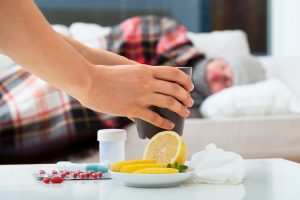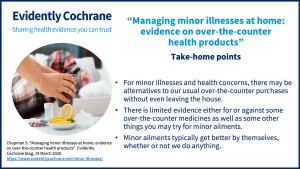In a blog for people with minor illnesses and other health concerns, Sarah Chapman blogs the evidence on over-the-counter medicines and other products.
Page last updated 23 June 2023 to reflect the post-pandemic context.
Take-home points
This blog first appeared during the COVID-19 pandemic when we were coping with restrictions on our movements and pharmacy shelves that were empty of empty of everyday medicines and other healthcare ‘essentials’ that we had taken for granted. In our post-pandemic world, it still feels like we can’t take for granted the availability of over-the-counter medicines and other products and need to be conscious that resources are limited.
Cough medicines
A Cochrane ReviewCochrane Reviews are systematic reviews. In systematic reviews we search for and summarize studies that answer a specific research question (e.g. is paracetamol effective and safe for treating back pain?). The studies are identified, assessed, and summarized by using a systematic and predefined approach. They inform recommendations for healthcare and research. Over-the-counter (OTC) medications for acute cough in children and adults in community settings (November 2014) highlights that there is no reliable evidence either for or against them. There were few side effects, all minor ones such as headaches, vomiting and drowsiness, but more people would need to be studied to detect serious and less common side effects.
Another Cochrane Review Over-the-counter (OTC) medications to reduce cough as an adjunct to antibiotics for acute pneumonia in children and adults (March 2014) also found an evidence gap, the benefits and harms for people in these circumstances unclear.
NHS advice
The NHS page on cough has advice on treating a cough yourself, and acknowledges the lack of evidence, but also suggests when a pharmacist could help and when to see a GP.
Honey for cough in children
Honey has been shown to have properties that work against bacteria, viruses and inflammation and it’s an ingredient in many OTC cough syrups. Many of you will have honey in your cupboards, so could this be useful for soothing a cough? The Cochrane Review Honey for acute cough in children (April 2018) showed that shows that honey is probably effective in relieving cough symptoms and may be at least as effective as some OTC preparations. You can read more in our blog by Dr Lynda Ware, Honey for cough in children: can it help?
t’s important to note that the use of honey for children under a year old is not advised as they could be made ill by the bacteria C. botulinum, which may be found in honey.

Tackling the common cold
Vitamin C
More clarity is needed from better research studies on the impact of vitamin C on the length and severity of colds. The Cochrane Review Vitamin C for preventing and treating the common cold (January 2013) found that it may reduce the likelihood of getting a cold only for people doing short periods of extreme physical activity, such as marathon runners and skiers.
Vitamin D
There is reliable, high-certaintyThe certainty (or quality) of evidence is the extent to which we can be confident that what the research tells us about a particular treatment effect is likely to be accurate. Concerns about factors such as bias can reduce the certainty of the evidence. Evidence may be of high certainty; moderate certainty; low certainty or very-low certainty. Cochrane has adopted the GRADE approach (Grading of Recommendations Assessment, Development and Evaluation) for assessing certainty (or quality) of evidence. Find out more here: https://training.cochrane.org/grade-approach evidence from this 2017 systematic review Vitamin D supplementation to prevent acute respiratory tract infections that vitamin D supplements “are safe and protect against acuteA health condition (or episodes of a health condition) that comes on quickly and is short-lived. respiratory tract infections overall”, with the most benefit for people who have vitamin D deficiency.
Antihistamines
There is also high-certainty evidence from the Cochrane Review Antihistamines for the common cold (November 2015) that antihistamines can reduce the overall severity of cold symptoms, in adults, in the first day or two only.
Other cold remedies…
How about the myriad of other things you might hear recommended, such as garlic, steam inhalations, echinacea and decongestants? Dr Lynda Ware has blogged about Remedies for the common cold and it is a story of uncertainty – we really need more and better evidence to be confident about the effects, both beneficial and harmful.
NHS advice
A cold will clear up by itself, but meanwhile you can find advice from the NHS on treating a cold yourself.

Add a dose of caffeine for pain relief?
Many over-the-counter painkillers have caffeine added. As well as wondering if they are worth the higher price, you may well be finding that the shop shelves are now empty of them. The Cochrane Review Caffeine as an analgesic adjuvant for acute pain in adults (December 2014) has reliable evidence that adding 100mg or more of caffeine to a standard dose of commonly used painkillers (most often paracetamol or ibuprofen) increases the proportion of people who get good pain relief from common pain conditions like headache and toothache. No serious adverse events were reported and the reviewers say it’s unlikely to be harmful if the recommended dose is not exceeded.
If you can’t get your hands on painkillers combined with caffeine, might drinking a cup of coffee with your usual painkiller be as effective? Review author Sheena Derry thinks it might be, as she commented to us: “The studies in this review did not state explicitly the form in which caffeine was given to the participants, but coffee is a good source of caffeine and we believe that a mug of strong coffee is equivalent to about 100 mg caffeine. Taking your usual painkiller with a mug of coffee certainly has the potential to be easier and cheaper” – and you might find it works for you.”

Painful nipples in breastfeeding women
I’ve written more about simple help for painful nipples in breastfeeding women but it’s worth repeating that a Cochrane Review Interventions for treating painful nipples among breastfeeding women (December 2014) found that applying nothing, or expressed breast milk, may be as good or better than applying an ointment, such as lanolin, for both nipple pain and healing, although better studies are needed to be confident about that. Regardless of the treatmentSomething done with the aim of improving health or relieving suffering. For example, medicines, surgery, psychological and physical therapies, diet and exercise changes., for most women, nipple pain reduced to mild levels seven to ten days after giving birth.
Here is NHS advice on Sore or cracked nipples when breastfeeding.

So, if you have minor illnesses and health concerns in these strange times…
It’s reassuring to remind ourselves that there are alternatives to our usual purchases, without even leaving the house, and that minor ailments typically get better by themselves, whether or not we do anything.
Join in the conversation on Twitter with @SarahChapman30 @CochraneUK or leave a comment on the blog.
Please note, we cannot give specific medical advice and do not publish comments that link to individual pages requesting donations or to commercial sites, or appear to endorse commercial products. We welcome diverse views and encourage discussion but we ask that comments are respectful and reserve the right to not publish any we consider offensive. Cochrane UK does not fact check – or endorse – readers’ comments, including any treatments mentioned.
Sarah Chapman has nothing to disclose.




The clarity and detail in your review showcase your commitment to offering valuable information to your readers. It’s evident that you’re dedicated to promoting wellness, and your expertise shines through. Keep it up.
It’s refreshing to see a casual tone combined with evidence-based information. The blog covers a range of common ailments, providing clear explanations and suggestions for managing symptoms. Whether it’s a cough, a sore throat, or a stuffy nose, you’ll find helpful tips to ease your discomfort. Thanks to the authors for making healthcare information accessible and relatable. Keep up the great work! 👍💪
What about zinc lozenges? I have seen two references from medical personnel recommending zinc lozenges as a means of retarding the development of viral infections. Any evidence?